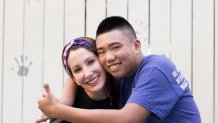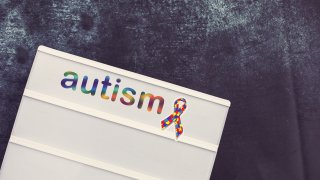Fashion has always been a personal passion for Jovana Mullins. But when the designer began volunteering her weekends as a fashion mentor with the art therapy program at the Center for All Abilities in 2017, she had no idea her life was in for such a dramatic turn.
At the time Mullins had already worked for many different luxury brands over her eleven years as a print and embroidery designer. But she was seeking a new opportunity that would combine her affinity for fashion with her passion for volunteering. That's when she first started working with the New York City non-profit which aims to empower children and young adults with autism to recognize their creative potential and thrive.
"After volunteering with CAA and seeing the incredible artistic talent this group had, a lightbulb went off... what if I used their artwork for prints on dresses, scarves, etc.," she said. "The artwork they create is so much more meaningful and imaginative than anything I've ever created for the brands I've worked for. I knew there needed to be a brand that celebrated these talents, provided a platform for expression, and connected consumers with the creativity and gifts that people with disabilities have."

Mullins soon left her full-time position in the fashion industry to build her own clothing line ALIVIA, (Awareness, Love, Inclusion, Voice, Individuality, and Acceptance.) The fashion brand employs designers with autism and transforms their artwork into vibrant prints. Every Alivia piece begins with artwork created by an individual with a developmental disability while participating in art therapy. The aim is to create a collection of prints that reflects the artist's artistic vision, personality and point of view. The company launched in April 2020.
Unfortunately, just as the couple was gearing up to launch their first collection, the COVID-19 pandemic hit. They had to quickly rethink the nature of the brand as consumers were suddenly trading in their designer dresses and heels for comfortable sweatpants and hoodies.
Rather than postpone the brand’s release, the designer used old bags of fabric scraps to create COVID masks as part of her new line. Mullins immediately started production and sewed, stich-by-stich, over a hundred masks by hand. With every one that was sold, Mullins donated a PPE mask to frontline staff at YAI, an organization that provides housing and support for individuals with developmental disabilities.
"Launching at the start of a global pandemic was never the plan, but I'm so proud we turned lemons into lemonade," said Mullins. Instead of focusing on sales, the designer focused on creating community through weekly 'Saturday Smiles'... a curation of positive news stories that celebrate inclusion and people of all abilities.
As for which print makes her smile the brightest? Mullins points to the “Happy Strokes Pink!” It's a design by eighteen-year-old Alan Li’s optimistic personality, which she describes as both vibrant and joyful.
But she's a huge fan of all three of her brand’s creators and continues to be impressed by each of their colorful styles and imaginations. Along with Allen Li, William Choi and Yu Chen are the other two artists whose prints are showcased in the current collection. Mullins hope is that her brand will in turn encourage more inclusion in the fashion industry.
"The mission is to provide specialized education for neurodiverse individuals, teaching valuable skills that will prepare them to work within the fashion and retail industry," she says. "From sewing and garment construction to sales and customer service, we plan to develop different pathways that will lead to meaningful employment throughout Alivia and other brands in the future."
A new collection is set to be released in October which will feature two original artists. Ten percent of every purchase is donated directly to the creator’s local non-profit and every garment purchased includes a scannable tag that allows consumers to experience the personal story behind the clothing.


